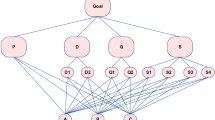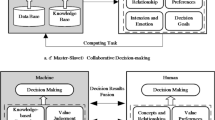Abstract
Individuals, organizations, and governments are often expected to make decisions of far-reaching consequences. Judgment and decision-making capabilities are important facets of human intelligence. Systematic studies of these topics have commenced only in the 1960s. Simultaneous developments in computer hardware and software and in fields such as artificial intelligence have given impetus to the study of human decision making from descriptive, normative, and prescriptive points of view. Realworld decision problems are often unstructured and difficult to formulate. There are multiple objectives, distributed decision makers and difficulties in acquiring different types of knowledge needed for problem solving. Human knowledge is often available in natural language with its inherent ambiguity and vagueness. While a human being has only “bounded rationality,” his intuition and common sense enable him to make good decisions in using qualitative nonnumerical information in narrow domains of expertise such as medical diagnosis. He has to be supported by decision aids when confronted with situations in complex systems. In this paper, we briefly review decision making in complex systems from the point of view of intelligent decision support systems, which applications to the project management task.
Similar content being viewed by others
References
Arkes, H. R., and Hammond, K. R. (1986).Judgment and Decision Making: An Interdisciplinary Reader, Cambridge University Press, Cambridge, UK.
Bellman, R. E., and Zadeh, L. A. (1970). Decision making in a fuzzy environment.Manage. Sci. 17, B141–B164.
Howard, R. A. (1988). Decision analysis: Practice and promise.Manage Sci. 14(6), 679–695.
Klein, G. E., and Calderwood, R. (1991). Decision models: Some lessons from the field.IEEE Trans. Syst. Man Cybernet. 21(5), 1018–1026.
Noronha, S. J. (1993).Intelligent Decision Support Systems for Project Planning and Scheduling, Ph.D. thesis, Department of Computer Science and Automation, Indian Institute of Science, Sept.
Noronha, S. J., and Sarma, V. V. S. (1991). Knowledge-based approaches for scheduling problems: A survey.IEEE Trans. Knowledge Data Eng. 3(2), 160–171.
Simon, H. A. (1986). Alternative visions on rationality. In Arkes, H. R., and Hammond, K. R. (1986) (eds.),Judgment and Decision Making: An Interdisciplinary Reader, Cambridge University Press, Cambridge, UK, pp. 97–113.
Watson, S. R., Weiss, J. J., and Dennell, M. L. (1979). Fuzzy decision analysis.IEEE Trans. Syst. Man Cybernet. 9(1), 1–9.
Author information
Authors and Affiliations
Rights and permissions
About this article
Cite this article
Sarma, V.V.S. Decision making in complex systems. Systems Practice 7, 399–407 (1994). https://doi.org/10.1007/BF02169361
Received:
Revised:
Issue Date:
DOI: https://doi.org/10.1007/BF02169361




